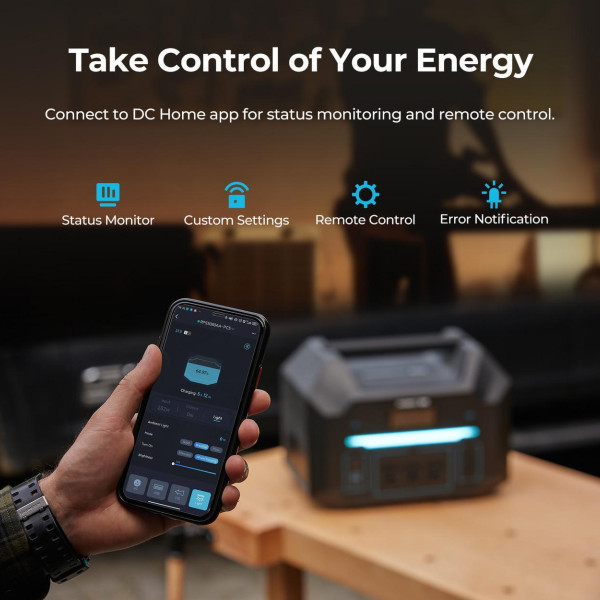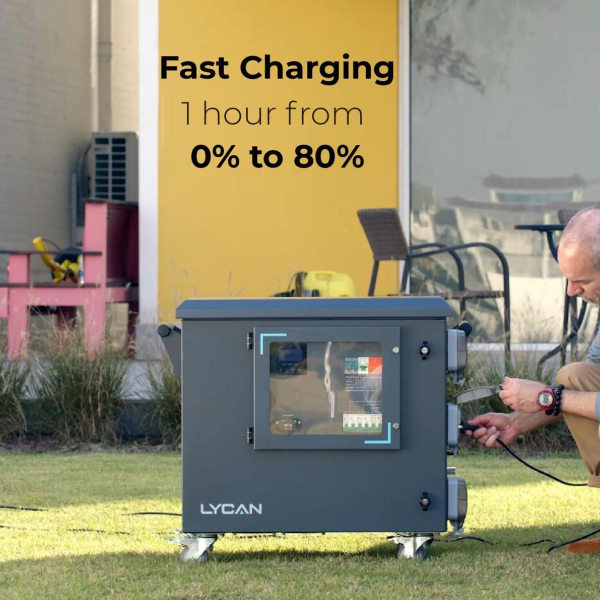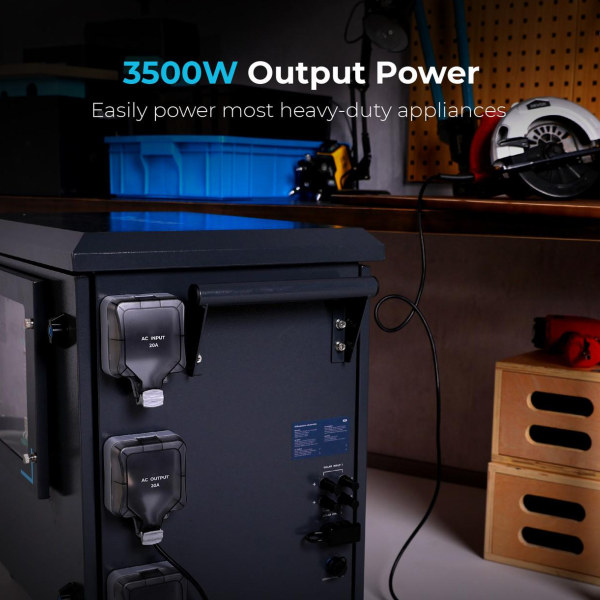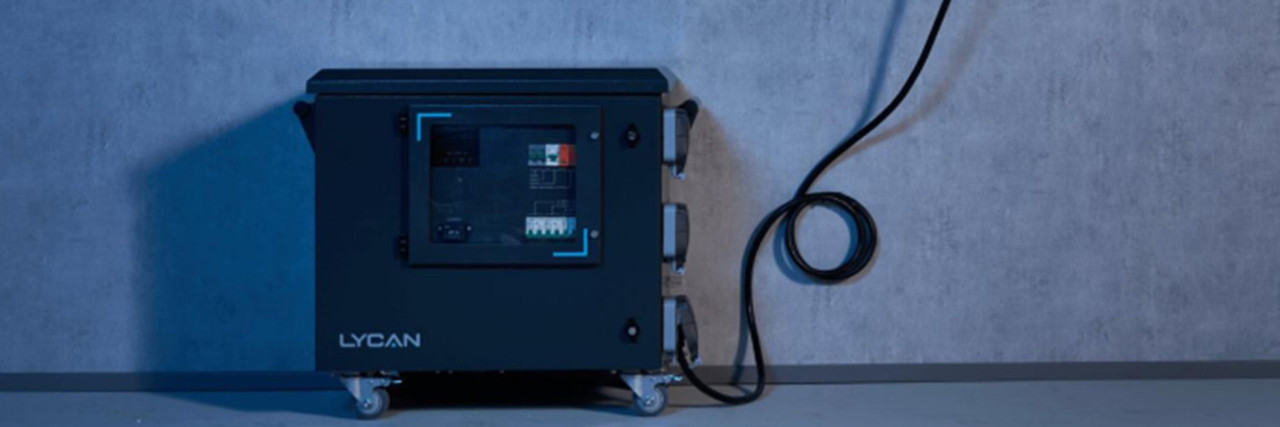What is a whole-house solar generator?
Whole house solar generators are portable battery storage systems powered by solar panels. If it's cloudy or raining, your roof's solar panels may fail. That's when a whole house solar generator is needed——one that can automatically power your home during a power outage. They can also be used as a source of power for camping, RVs, and boats.
Understanding Whole House Solar Generators
A solar generator is simply an all-in-one device that combines several solar technologies into one portable device. The devices combined in a solar generator are including inverter, converter, charge controller and battery, sometimes including solar panels.
Some manufacturers may call solar generators by different names if the solar panels don’t come with the portable unit such as: solar powered generators, solar power stations and solar power boxes.
Can a Solar Generator Power a Whole House?
The answer is yes if you pick the right house solar generator. If the battery capacity or inverter power output is insufficient, your whole-house solar generator won't power your home for a long time. Whole-house size is also a factor you need to consider when choosing it.
Why Choose Whole House Solar Generators
Whole-house solar generators are an attractive solution to your power needs because:
- Their components work well together: The compatibility of a solar generator's components is high and it's easier to monitor and manage the unit with the DC Home App.
- They are easy to install: A whole-house solar generator only needs a few connections to start working.
- There is no need for complex calculations and component matchmaking: The components come in the right pairings.
- They are portable: Unlike a traditional solar setup, a solar generator is not fixed and can be used for other purposes, e.g., camping, parties, construction, etc.
Whole House Solar Generator vs traditional solar system, which is better?
If you are an average homeowner with little electrical knowledge, a solar generator is usually the better choice because solar generators have many advantages that cater to your specific needs:
- Simplified connections that shorten setup time.
- Portability that enables you to carry your solar generator and use it for other purposes like parties, camping, construction, etc.
- Easy to manage and monitor through one unified app or system using smartphones and other devices.

Renogy DC Home App
On the other hand, a traditional solar setup might be better for individuals who are comfortable with hands-on work and calculations. Unlike solar generators, traditional solar setups, such as roof-mounted solar panels, involve more complex installation steps and require purchasing various standalone components that need to be properly matched and integrated.
Traditional solar’s benefits that are attractive to another group of people are:
- Lower cost in long terms: Considering federal tax credits and other incentives, the cost may be lower in the long run than purchasing a home solar generator.
- More Flexible: It is possible to expand the solar system components to provide more power according to home power needs. And well-maintained solar systems can last two decades or more if properly cared for.
- Large power storage: A complete solar system can provide power to your home or equipment for a long period of time without interruption and is more suitable as a long-term power supply equipment, while the whole-house solar generator is suitable for the existence of a backup power supply.
What Size Solar Generator Do You Need to Run a House?
To determine the size of the solar generator you need to run a house, here's what you need to know:
- How much energy does your home use each day?
You can get this information from your power utility bill. If it's not listed on the utility bill, you can calculate the number of Watt-hours you use each month by subtracting your last two months' energy usage (measured in Watt-hours, Wh). Take the result and divide it by the number of days to find the energy used each day. The average US household uses between 15000Wh to 30000Wh each day.
- How much power will you use at any given moment?
To calculate this figure you must make a table with all your devices and sum up all their Wattages to find the total power output needed to run your home. According to data from the Energy Information Agency (EIA), the average home needs an average of 1250 W each hour (30000 W/24 hours). Note that 1250 W is an average load NOT the actual load on the system. In reality, the load ranges from 1000W to 7000W.
- What size of inverter is proper to run your home?
The size of the inverter should at least be 120% greater than the power needed by your house. Suppose your total wattage is 3000W. In that case, your inverter should be around 3600W.
- The capacity of the battery
The storage capacity of your solar generator's batteries should be twice that of your energy consumption when there's no sunlight. Suppose you use your batteries overnight and use an average of 500Wh for 12 hours. In that case, your total consumption would be 6000W. So your ideal battery capacity would be 12000Wh.
- The number of solar panels
The minimum number of solar panels you need is calculated by dividing your battery pack's storage capacity (Watt-hours) by the product of your region's peak sun hours and your solar panels' wattage. Let's say you have a 10000Wh battery pack, 5 peak sun hours, and 320W solar panels. You would need at least seven 320W solar panels to charge your battery pack. And this is only a minimum estimate that doesn't account for any power you might use while your battery is charging.
If all these calculations confuse you, don't worry. Try out our simple solar powered calculator that will do all the calculations and even give you recommendations.
How much does a whole house solar generator cost?
The price of whole house solar generators ranges from a few hundred dollars to well over $6000.
Comparatively, you might find that our generators offer better value for your money, including long battery lifespans and device warranties.
Lycan 5000 Solar Generator
The Lycan 5000 is the ideal whole house solar generator because it is specifically tailored to meet the average home’s energy needs. The Lycan 5000 boasts a 4800Wh LiFePO4 battery capacity and an AC power output of 3000W (7000W peak power).

How to choose the best whole house solar generator?
Here’s what you should know if you want to choose the best whole house solar generator:
1. Battery Lifespan and Storage Capacity: A solar generator is a huge investment so it should be able to last for a long time to make it worth its cost. For the best experience, a whole house solar generator should have LiFePO4 batteries (can last 10 years if used correctly) and an energy storage capacity of at least 4000Wh.
2. Inverter Type and Output: The ideal inverter in your generator should be a Pure Sine Wave (PSW) inverter that is compatible with all electronics. In addition, the inverter’s AC power output should at least be 3000W.
3. Cost: For the best value for your money, your chosen solar generator unit should cost around $5000 or less. When it comes to buying solar generators, cheaper isn't always best as cheaper solar generators are guaranteed to have low-quality components like lead acid batteries that may last for a year.
4. Recharge Stats and Options: The best solar generators can charge using two methods at the same time. This will drastically reduce the time needed to recharge to around 1 hour. Take, for example, the Lycan 5000 that can charge using AC power from the grid (max 2400W) and Solar Panels DC power (max 4400W) at the same time for a max input power of 6800W.
5. Expandability: Your energy needs today won't necessarily be the same as tomorrow's. Your family might have more members or you might get more electronics that need power. Either way, you need a solar generator with an expandable battery pack that can accommodate any future changes in your energy needs. The Lycan 5000 is an excellent choice because its battery pack is expandable from 4800Wh to a maximum of 19200Wh.

Best solar generator for homes: Lycan 5000
It’s no secret that we think that the Lycan 5000 solar generator is the absolute best solar generator for your home. If you are not convinced, let’s take a look at some of its features:
●Long-lasting 4800Wh battery pack expandable to 19200Wh: The LiFePO4 batteries with a lifespan of 4500 lifecycles can easily last for over 10 years. Moreover, the expandable battery capacity should be enough to meet your needs.
●A 3500W inverter with a peak power rating of 7000W: 3500W should be enough to run most of your household appliances. If you have many power-hungry devices it's recommended not to use them at the same time. In addition, the 7000W peak power should be able to support the startup of most of your devices.
●Max 6800W power input for fast recharge: Charging at the maximum 6800W will cut down your recharge time to around an hour. This means you can use the extra energy for whatever you want. For example, you can feed back the excess power back into the grid and make a profit.
●Can be used as an uninterruptible power supply (UPS): If you have critical electronics that must be kept running 24/7 or you simply don’t like interruptions, the Lycan 5000 can seamlessly take over as your power supply whenever there’s a blackout.
With the above features, we believe you will find the Lycan 5000 to be the best solar generator for your home. If you buy the Lycan 5000 during a sale you can enjoy an excellent one-of-a-kind discount. Keep tuned on Renogy whenever it’s a holiday!
You might also consider buying the Phoenix 1000 or Phoenix 500 if the Lycan 5000 is more than you need now. If you buy the Phoenix 1000 or the Phoenix 500, we highly recommend you buy two of them so you can run them in parallel for twice the performance.
Check out the Lycan 5000 and our other products, or contact us if you have any questions.








